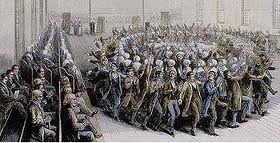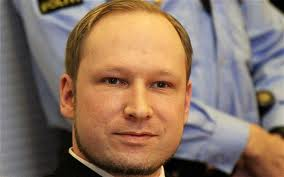I thought it was pretty interesting that Le Guin mentioned William James in the essay. If I am thinking of the same William James (and I believe I am), than he is the very same William James who as a famous psychology teacher. And in teaching psychology, he undoubtedly came across the Scapegoat theory, which is what Le Guin mentions as part of her ideas for the essay she wrote. I always think it is so interesting when my classes overlap like this, it really makes me feel that I am learning new things. The scapegoat theory, according to psychology, is when one group, the "in-group", blames all the bad happenings on another group, the "out-group". The "in-group" is often the majority, with the "out-group" as the minority. This is a lot more common than you'd think. The most famous example would be the Holocaust in my opinion. The holocaust is when the Germans used the Jewish people as scapegoats for the problems their country was having. Although that is a pretty extreme example, facillitated by the leadership of the insane and very charismatic Adolf Hitler. We as humans are actually a group that tends to scapegoat and stereotype. We almost always identify with our group, which is our "in-group". That leaves everyone else in the "out-group" and we are almost always stereotyped against them, making them easy targets when things go wrong. I think that brings up another comparison between our world and Omelas.
The sun is the basis of all of our life on Earth. So it makes sense that we would want to know as much as possible about it. However there is a lot of diffuculties in trying to get close enough to the sun to gather information. For one, it is HOT. So scientists are trying to get past the obstacles to get close enough to our source of life. And according to BBC, they have had a breakthrough. Here is the article:
http://www.bbc.co.uk/news/science-environment-17743190 The article talks about how scientists in Great Britain are leading a team that is going to get a special probe (SolO) closer to the sun than ever before. They want to measure the patterns on the sun, and how they may affect us here. One of the ways they affect us is through aurora borealis, northern lights. I think it is amazing that particles from the sun, so far away, can be affecting us so strongly here. The expedition is set to launch on the 50th anniversery of Britain's first exploration into space. I'd just like to point out that it was us that won the space race. They came just a little late. As close as this probe is relatively, in reality it is still 42 MILLION kilometers from the surface of the sun. It's crazy to think about. If I knew more about the specifics of how this science works I could talk more about it, because I think it is pretty interesting, but for now I'm just going to have to leave you with the article. The story about Olemas that we just read in class made me think of a Utopina society in the beginning of the writing. I have heard things about Utopian societies before, and we have discussed a few in A.P. united states history actually. There was a huge movement to try and create utopian societies at one point. They included the shakers, the Oneida community, and Brook farm. The Shakers were a religious cult, called the Shakers because they shaked violently when in worship. The Oneida community was an attempt at a community that shared everything. EVERYTHING. Wives, husbands, food, shelter, water, anything at all. The Brook farm was an experiment by some transcendentalists (you may have heard of a few) to make a communal living place full of like-minded intellectuals. What do all of these communities have in common? None of them worked. All of the ideas always seemed kind of unrealistic to me anyways, but I wonder if there are reasons that us humans cannot live together like that. One idea is like the one in the essay; that we cannot have a utopian community because there is no light without dark. Another is that we as humans, are selfish and tend do not do what we should morally, which fits in more with Peter Singer's ideas. I think that it is some combination of both. I think that we as humans are not made to live completely selflessly. It goes against our grain. So I do not think that a Utopian Society is possible.
The world's most endangered tribe, according to BBC, is the Awa of the the Brasilian rainforest. The Awa live in the forest, and it is estimated that only a portion of them have ever even had contact with the outside world. They live in very small communities, and roam and hunt in extended family groups of around thirty. This kind of living seems incomprehensible to us, who live in America. It seems like something you only read about in history books, about the hunters and gatherers of 10,000 years ago. Why are they the most endangered tribe of the whole world? Because their territory is being enroached upon by illegal deforesting operations. The rate of deforestation in Brazil is continuing at an alarming rate. The territory of the Ama tribe is technically protected under the Brasilian Constitution, but nobody seems to be doing anything about the illegal wood-cutting that is still rampant. The article says that people are calling for attention to the cause, to put pressure on the government. Sound familiar? Kind of sounds like the Kony 2012 campaign to me. Except nobody is paying attention to this cause. So what makes it different? This cause has violence, even against children. This cause is a big group picking on a small one. I think that what really makes it different is the awareness of the cause. People are not aware of the Awa, so they're not aware of the cause. It really makes the point that awareness can do something to help a cause.
The issue of abortion is a touchy one. Even here, where it's been legal for decades following Roe v. Wade, it remains a hot topic of presidential debates and legislatures. There's a lot of reasons that each side has that they very strongly believe in, and this results in high tempered arguements. I just read an article that from BBC that talked about Ireland's recent shift towards legalizing abortion. Historically, it has been absolutely illegal for any type of abortion in Ireland. One reason for this is that the Catholic church has had huge influence on the social aspect of Ireland for centuries. So why is now any different? Because people are starting to question the church amidst it's very own corruption and scandal. (If you've been reading my posts about the book Wide as the Water this should sound pretty familiar). There has been a recent rash of sexual abuse scandals in the church, and that combined with the huge leaps and bounds we've made in medicine and technology has started to turn people's views. Women are starting to assert that it is their body, and their choice. And there are people agree. Many more agree with the view that it should be legal for people who have been raped, or who have a terminal illness or some other complicating factor (which it is not legal for as of now). Ireland's debate shows the changing views not only on church, but on many modern issues.
I thought that the article we read was very interesting. It really shows how Peter Singer's ideas can be applied to people's real lives. These people decided to give away their house, mostly on the whim of their fourteen year old daughter. I don't know about your parents, but my parents would laugh and say "NO" if I suggested we sell our house. They must be some special kind of parents, or perhaps already been feeling along the same lines as their daughter. Not that their daughter, Hannah, doesn't have a good point. The fact that they live in the house they do while someone else is on the street doesn't seem fair. However, I would be curious to know the stories of both the parties involved. The man had a good job, obviously went to college as he worked for one of the largest news firms in the country. He probably worked hard in school and hard at his job. Maybe that's me being naive, I don't know. I would like to know the story of the homeless man on the street. He probably did not have the opportunitites to thrive that the father did. I think that THAT is the problem people should be trying to solve, not the problem of people lacking a mercedes coupe. I know I'm jumping around a lot with points in this article, but another one I'd like to make is that for these people, moving to a house half their size is not much a hardship. Their first house had an ELEVATOR. They're going from 6500 square feet to 3250. That is still a prettttyy big house. They have the room to do this and still be pretty dang comfortable. So what I'm saying is that it's easier for them to give this up than it would be for some other people and still maintain their lifestyle.
I recently read an article on BBC that talked about the tril of Anders Breivik. Breivik is a man from who last year committed horrible crimes. He killed seventy-seven people by car bombings and shootings at a camp for children. Many of the people he killed were under 17. The way that the article describes that man, and the statements his lawyer has given are shocking. He seems to feel no remorse whatsoever for his actions. Indeed, he seems to be proud of them, and believe that what he did was necessary. He even feels that he has prevented a war in Europe. To us he sounds pretty delusional. While I was reading it, a disorder that we recently studied in Psychology came to mind. It is called Antisocial Personality Disorder. One of the main characteristics of this disorder is a criminal past (from moderate to severe) and a complete lack of guilt or empathy. Just as a little disclaimer, I am not saying I am a Psychologist or anything of the sort. Antisocial personality disorder is a very rare disorder, but if you look at all the most famous serial killers, almost every single one has it. That gives it a sort of dark fascination, and makes people want to learn more about why and when it occurs.
On thursday I went to a conference, for Women in Science and Engineering. The point of the conference was to get more girls my age and younger to be interested in these career courses. They're always looking for more diversity in these fields that are mainly dominated by men, so there's a lot of oppurtunities for a woman who is looking into one of those careers. It was held at Iowa State University, and as usual they did a great job of selling the college while we were there. The real point of the conference though was to get us thinking about math and science. While I was there, I went to four different sessions where they talked about various careers you could have that involved math and science. Some were pretty boring, with even worse speakers. There were a few that actually were very interesting. There was one that I went to that I particularly liked. The official title of the session was "bioinformatics" which sounds extremely boring. I was not excited to go. When we got there though, they directed us to a lab. Once we were in the lab they started telling us exactly what they were doing in this lab, which was basically dissecting mouse eyes. It sound kind of gross, but it turned out to be really interesting. They were finding certain types of cells in eyes, and figuring out what made the "eye" stem cells turn into the different variations. The eventual goal of the project was to be able to solve problems with blindness, particularly glaucoma. I thought that it was great that they could show us something like that, and that something like that is happening in Iowa, practically in our backyard, where we usually
In the first part of the the interview that you had me watch, there was this one spot that I thought was somewhat interesting. Peter Singer is asked by the woman about his point that we should put our self-interest aside. That indeed we now have a responsibility to, since we can afford to do so in this age of affluence. I thought this was interesting because it touches on so many other things. To put self interest aside is not something that people are really comfortable doing, says Peter Singer. And I agree. No matter who you are, you do (or have) hesitated before putting others before your self. And I think that this does not make us bad people, I think that it is a natural thing. If you look at it from an evolutionary standpoint, those ancestors who had consistently put their self interest aside would most likely not survive, given that way back when they did not have wealth to throw around. Back then, they mostly just tried to survive. Now, however, we do have the wealth. That is Peter Singer's point, that because we can now afford to put our self-interest aside, we should do so, even if it makes us slightly uncomfortable. And I think that he is right. Now that we in first-world countries are not struggling to survive, we should use what we have in excess to help those that are.
Everyone has heard about the recent murder of Trayvon Martin. It was huge news. People were outraged, they wanted Mr. Zimmerman dead, they wanted him arrested, there were riots, the public was in a fury. My family and I actually flew into Stanford, Florida, for vacation shortly after it happened. It is understandable, that people are furious. No one is happy when a seventeen year old kid is shot and killed. And they direct their anger, naturally, at his murderer. But could it really have been in self-defense, as claimed by Zimmerman? More evidence is coming out that yes, it could. The simple fact that the police have not arrested Zimmerman yet is a glaring testament to that. With this being such a high profile case, if there was any evidence against the man he would be snatched up like THAT. The Stanfod police say that there is no evidence yet that Zimmerman was acting outside the law, since Florida has a "stand your ground" law allowing self defence when threatened. But even if Zimmerman wins his case, I don't think that he will REALLY win. The public has already convicted him in their minds. He will not get his life back, he most likely won't be able to be comfortable in public again. The man's life is ruined. Is it really right to convict someone before they've had their fair and honest trial? Our constitution would say not.
|



 RSS Feed
RSS Feed